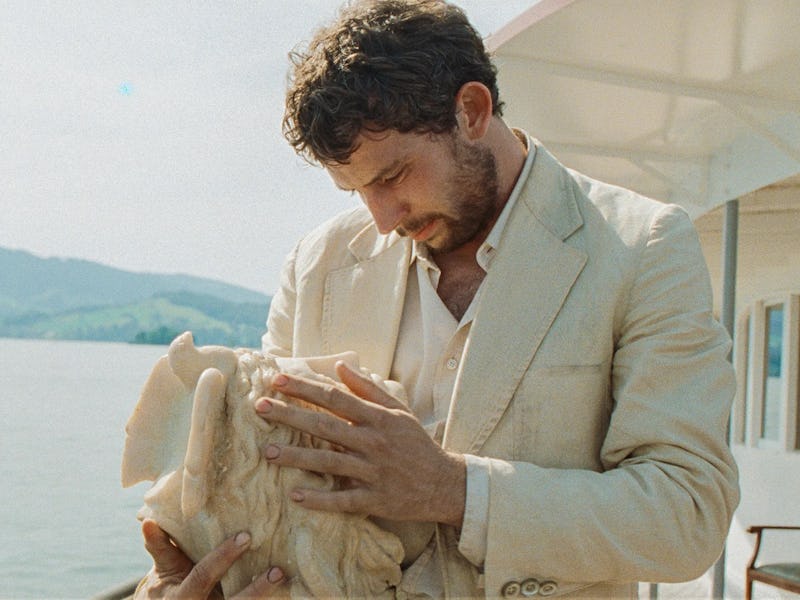La Chimera is an Unearthly Ghost Story
The red string of fate leads us on a strange trip through the underworld.

“You were not meant for human eyes.”
So says the bedraggled British archaeologist Arthur (a terrific Josh O’Connor) to the head of a perfectly preserved Etruscan statue he and his crew of tomb raiders have found in a forgotten grave. Well, less found than pilfered — Arthur and his ragtag team are no more than common thieves who spend their days robbing graves and selling their stolen goods to a mysterious and powerful art collector Spartaco (Alba Rohrwacher). But this wistful little sentiment feels like it could apply to La chimera itself, Alice Rohrwacher’s haunting, elegiac drama that seems like it was lost to the sands of time — and was only just now unearthed for our viewing pleasure.
A heist story, a ghost story, and a love story all at once, La chimera is an entrancing trip through the Italian countryside in the ‘80s that feels something like a waking dream. It might be because it opens with Arthur dreaming of his deceased love Beniamina (Yile Vianello), reliving a memory that will haunt him through the rest of the film. But it is also likely because there’s a hazy sense of unreality to the entire film. La chimera doesn’t quite have the same level of magical realism as Rohrwacher’s last film Happy as Lazzaro, but it dances between life, and the afterlife, the past, and the present in a way that blurs together these planes of existence until you wonder whether those memories of Beniamina really might be apparitions, beckoning Arthur towards death. It might be why he spends his time searching through graves for skeletons that are no longer there, and rifling through these buried treasures for a glimpse of the divine. “Everyone’s searching for their chimera,” one of the crew remarks, and it’s clear that Beniamina is Arthur’s chimera.
In Greek mythology, a chimera is a fire-breathing hybrid creature with a lion’s head, a goat’s body, and a serpent’s tail. But no monsters appear in Rohrwacher’s La chimera (except for maybe Arthur’s own personal demons), so it’s clear that the movie works by a different definition of the word. The New York Times offers a definition that is more fitting for the movie: “‘Chimera,’ the word — with a small ‘c’ — (has) passed into our lexicon, becoming shorthand for all that (is) illusory, grotesque, wondrous and out of reach, a three-way bridge between the human, the divine and the netherworldly.”
The tomb raiders of La chimera celebrate their latest haul.
Rohrwacher’s film walks that bridge delicately and elegantly, until it comes to a crossroads when Arthur meets Italia (Carol Duarte). A single mother who cleans the house of the eccentric Flora (Isabella Rossellini), Beniamina’s mother who is still fond of Arthur, Italia is the earthy, grounded presence that Arthur needs to pull him out of the past. The two of them fall into a shy, timid romance, mostly marked by Arthur showing up absolutely filthy and covered in grave dirt, while Italia’s kids try to help him make himself decent. But even as La chimera takes a turn towards becoming a warm, slice-of-life story, the ghosts never leave. Instead, they linger on the edges of the frame, haunting and plaguing Arthur until he has no choice but to return to a life of criminality.
But La chimera doesn’t make judgments about right or wrong, or even between life and death. As appealing and lovely as Italia is, so is the hardscrabble tomb raiding crew that Arthur is a part of, grimy, morally gray, and devoutly loyal to each other. The film simply is about a man who straddles both worlds. The call of life with Italia is just as strong as the allure of the memory of Beniamina — after all, Arthur is Orpheus, searching underground through the remnants of the afterlife so that he can find his Eurydice. It all leads up to an awe-inspiring ending, in which the ghosts and the red string of fate all come together for a resolution that is sad, and ecstatic, and bittersweet all at once.
It’s a mythic ghost story rendered intimately personal, so much so that we, the audience, feel like an interloper in this man’s grief, and in his strange, surreal trip through this sun-dappled underworld. Maybe La chimera was not made for our human eyes, but you can’t look away.